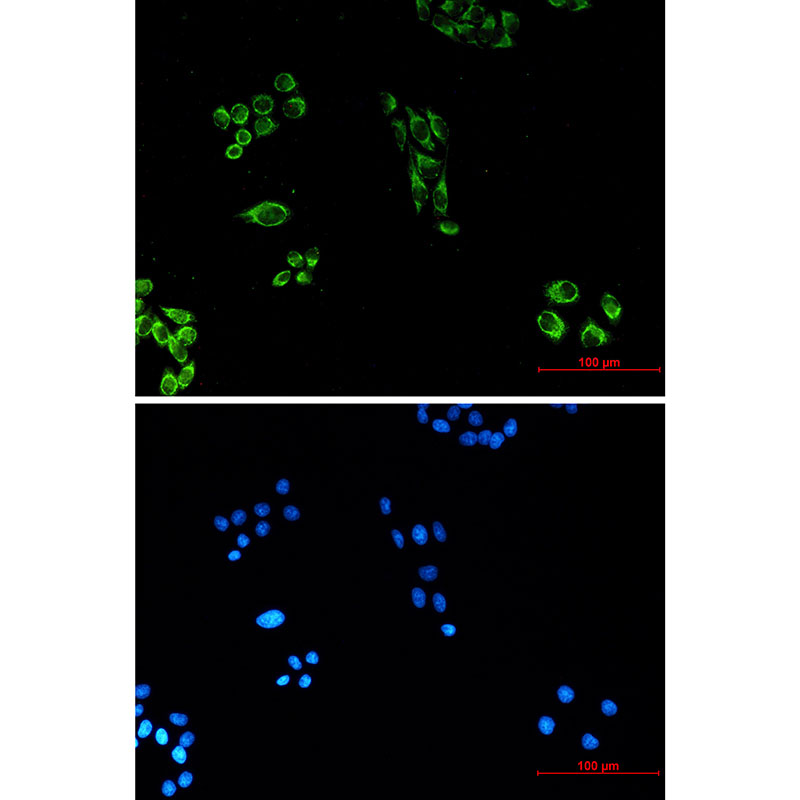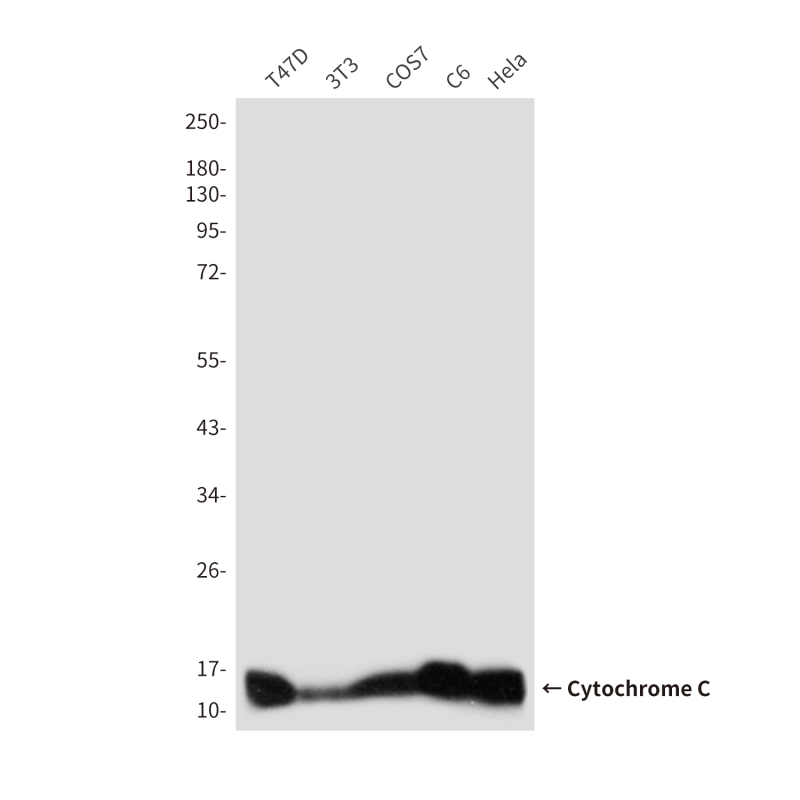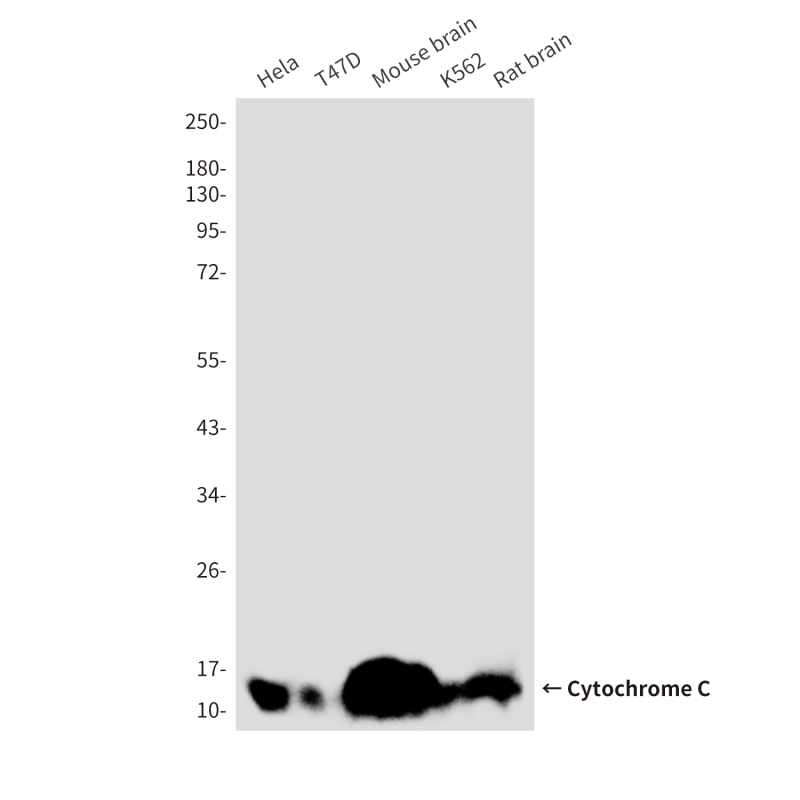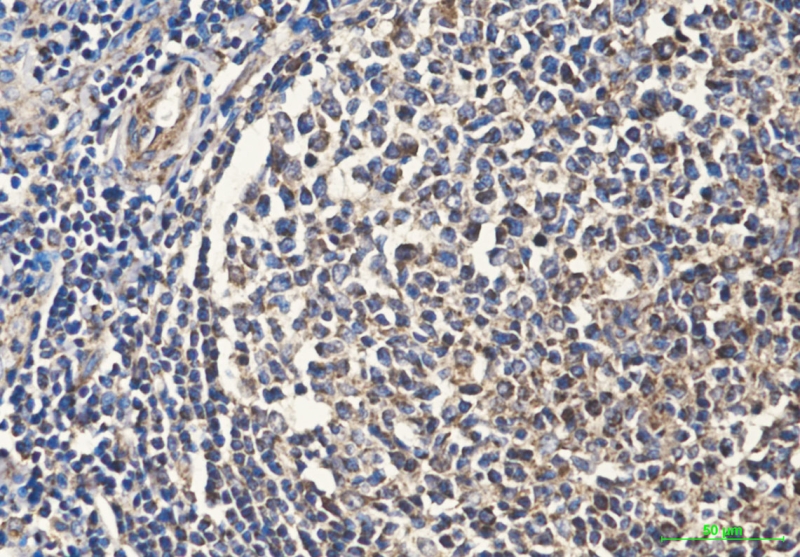



| WB | 咨询技术 | Human,Mouse,Rat,Chicken |
| IF | 咨询技术 | Human,Mouse,Rat,Chicken |
| IHC | 1/50-1/100 | Human,Mouse,Rat,Chicken |
| ICC | 1/50-1/200 | Human,Mouse,Rat,Chicken |
| FCM | 咨询技术 | Human,Mouse,Rat,Chicken |
| Elisa | 咨询技术 | Human,Mouse,Rat,Chicken |
| Aliases | CYCS; CYC; Cytochrome c |
| Entrez GeneID | 54205 |
| clone | 7C5 |
| WB Predicted band size | Calculated MW: 12 kDa; Observed MW: 12 kDa |
| Host/Isotype | Mouse IgG1 |
| Antibody Type | Primary antibody |
| Storage | Store at 4°C short term. Aliquot and store at -20°C long term. Avoid freeze/thaw cycles. |
| Species Reactivity | Human,Mouse,Rat,Chicken |
| Immunogen | Recombinant Protein of CYCS |
| Formulation | Purified antibody in PBS with 0.05% sodium azide,0.5%BSA and 50% glycerol. |
+ +
以下是3篇关于Cytochrome C抗体的代表性文献摘要简述:
1. **文献名称**:*Cytochrome c release from mitochondria during apoptosis: Mechanisms and implications*
**作者**:Liu X, Kim CN, Yang J, et al.
**摘要**:本文研究了线粒体释放Cytochrome C在细胞凋亡中的分子机制,通过Western blot和免疫荧光技术验证了特异性抗体在检测Cytochrome C亚细胞定位中的作用,揭示了其在凋亡信号通路中的关键调控功能。
2. **文献名称**:*Development of a monoclonal antibody-based ELISA for detection of cytochrome c in human serum*
**作者**:Wang Y, Zhang H, Li M.
**摘要**:研究团队开发了一种基于单克隆抗体的ELISA方法,用于定量检测人血清中的Cytochrome C水平,验证了该抗体在疾病生物标志物筛选(如癌症和心肌梗死)中的高灵敏度和特异性。
3. **文献名称**:*Immunohistochemical analysis of cytochrome c in tumor tissues: Correlation with chemoresistance*
**作者**:Rodriguez J, Fernandez A, Martínez-Campa C.
**摘要**:通过免疫组化技术分析肿瘤组织中Cytochrome C的表达模式,发现其定位异常与化疗耐药性显著相关,提示Cytochrome C抗体在癌症预后评估中的潜在应用价值。
4. **文献名称**:*Mitochondrial cytochrome c oxidation in neuronal injury: Antibody-based detection approaches*
**作者**:Kagan VE, Tyurina YY, Jiang J, et al.
**摘要**:探讨线粒体Cytochrome C氧化修饰在神经退行性疾病中的作用,利用特异性抗体揭示其在神经元损伤中的氧化状态变化,为神经保护策略提供分子机制依据。
(注:以上文献信息为示例性内容,实际引用需根据具体研究检索PubMed等数据库获取准确信息。)
Cytochrome C (Cyt C) is a small, highly conserved heme-containing protein located in the intermembrane space of mitochondria. It plays a dual role in cellular processes: as an essential electron carrier in the mitochondrial respiratory chain and as a key mediator of apoptosis. During apoptosis, Cyt C is released into the cytoplasm, triggering caspase activation and programmed cell death. Antibodies targeting Cytochrome C are critical tools for studying these biological processes.
Cyt C antibodies are widely used in techniques like Western blotting, immunohistochemistry, and flow cytometry to detect its expression, localization, and release under various conditions. They help researchers investigate mitochondrial function, oxidative stress responses, and apoptotic pathways in diseases such as cancer, neurodegenerative disorders, and ischemia-reperfusion injury. These antibodies are typically raised in hosts like rabbits or mice using purified Cyt C antigens, and their specificity is validated through knockdown/knockout controls.
Due to Cyt C’s evolutionary conservation, its antibodies often exhibit cross-reactivity across species, making them versatile in comparative studies. However, researchers must verify antibody compatibility with their experimental models. Overall, Cytochrome C antibodies remain indispensable for unraveling mitochondrial biology and apoptosis-related mechanisms in health and disease.
×